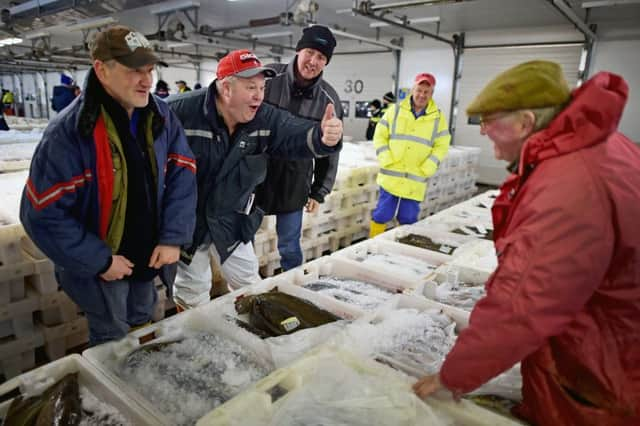Brexit: '˜It's not what we voted for', Fishermen fear tide is out


Fishermen from the Aberdeenshire town gather here every day, with the conversation naturally turning to the issue on everyone’s minds – Brexit.
Peterhead is Europe’s largest white fish port, handling tens of millions of pounds worth of fish such as cod and haddock each year. Every day thousands of boxes of fish are landed and assembled in neat rows inside the vast, chilled warehouse where they are auctioned off first thing in the morning.
Advertisement
Hide AdAdvertisement
Hide AdMany of the fishermen in this part of Scotland voted Leave in 2016, convinced that doing so would guarantee the UK’s release from the EU’s Common Fisheries Policy (CFP) and allow them to control the size of their catches once again. But almost two-and-a-half years down the line they are growing increasingly concerned the draft Brexit deal secured by Theresa May will not lead to the UK becoming the “independent coastal state” the Prime Minister has promised.
John Buchan, 63, a life-long fisherman who owns the Atlantic Challenge, is scathing in his assessment of the deal.
“I cannot believe it, it’s just a total mess,” he says.
“It’s nothing we voted for anyway. We voted to leave the CFP, take back our borders and make our own rules. All that’s happening now is we’re getting out in name only.
“Somewhere down the line we’re going to guarantee the other fleets a share of our quota. We’ll be traded away.”
Mr Buchan felt so strongly about leaving the EU that he sailed his trawler down the River Thames as part of a pro-Leave flotilla organised by Nigel Farage a week before the referendum.
He is still angry now. “Go to Fleetwood, Milford Haven, Grimsby – they remember going down their harbour and seeing boats from wall to wall,” he says. “We’re lucky here, we’ve still got an industry. But you go out around Shetland and the foreign fleets are unbelievable. We’re taking a minority share of our stocks.”
The industry’s concern stems from the vague nature of the draft deal between the EU and UK when it comes to fishing rights. It simply states both sides will use their “best endeavours” to conclude and ratify an agreement “on access to waters and fishing opportunities” by the middle of 2020.
The Scottish Fishermen’s Federation yesterday described this “ambiguous language” as “a ploy designed to delay tough decisions for another day”, raising fears the EU will demand continued access to UK waters in return for giving British seafood suppliers tariff-free access to its huge market.
Advertisement
Hide AdAdvertisement
Hide AdEngineer James Buchan, 62, runs a ship repair company he started with his father 35 years ago.
He says: “I think we will eventually leave the CFP, but the danger for me is the next stage, if we go into a negotiation that could drag on forever. It’s like going into a cage and the EU’s got the keys.”
“Maybe Theresa May trusts the EU, but there’s nobody in the fishing communities of North-east Scotland who would trust the EU. We’ve seen what they’ve done to our communities over the last 43 years.”
David Leiper is a director at fish processing firm Seafood Ecosse, which mainly supplies the European market.
Describing the week’s tumultuous political developments as an “absolute shambles”, he gloomily predicts the UK’s exit from the CFP could extend far beyond 2020 by five or even seven years.
But not all fishermen are so political. John Campbell, 30, the skipper of the Tranquility confesses he simply feels sorry for the Prime Minister.
“We’ve enough bother catching the fish,” he says.
